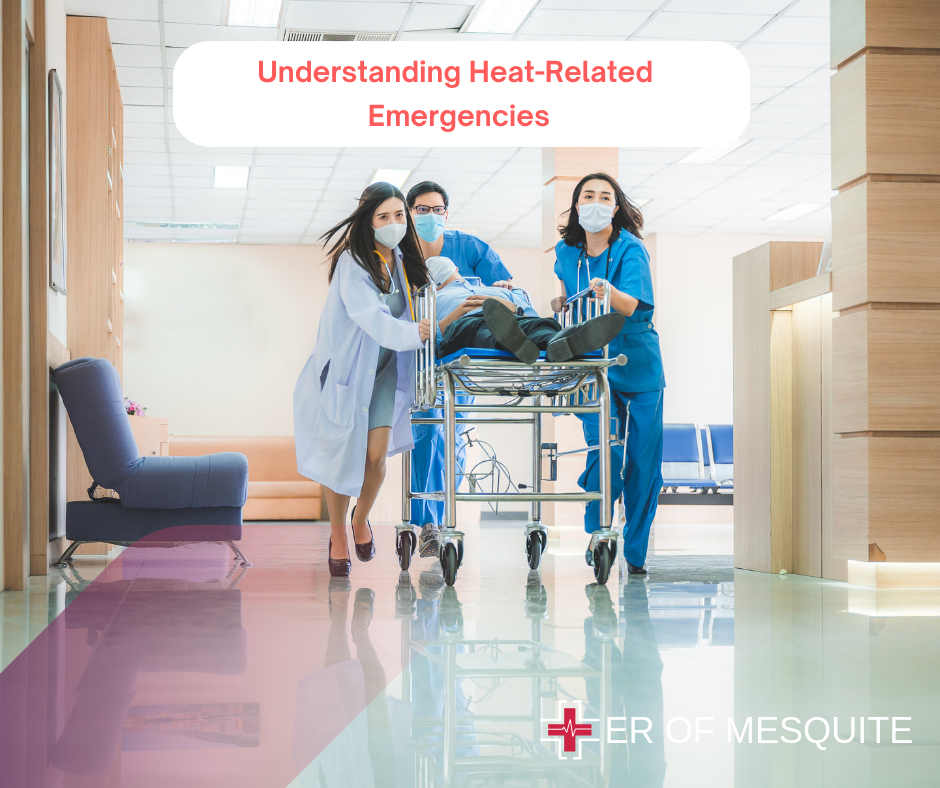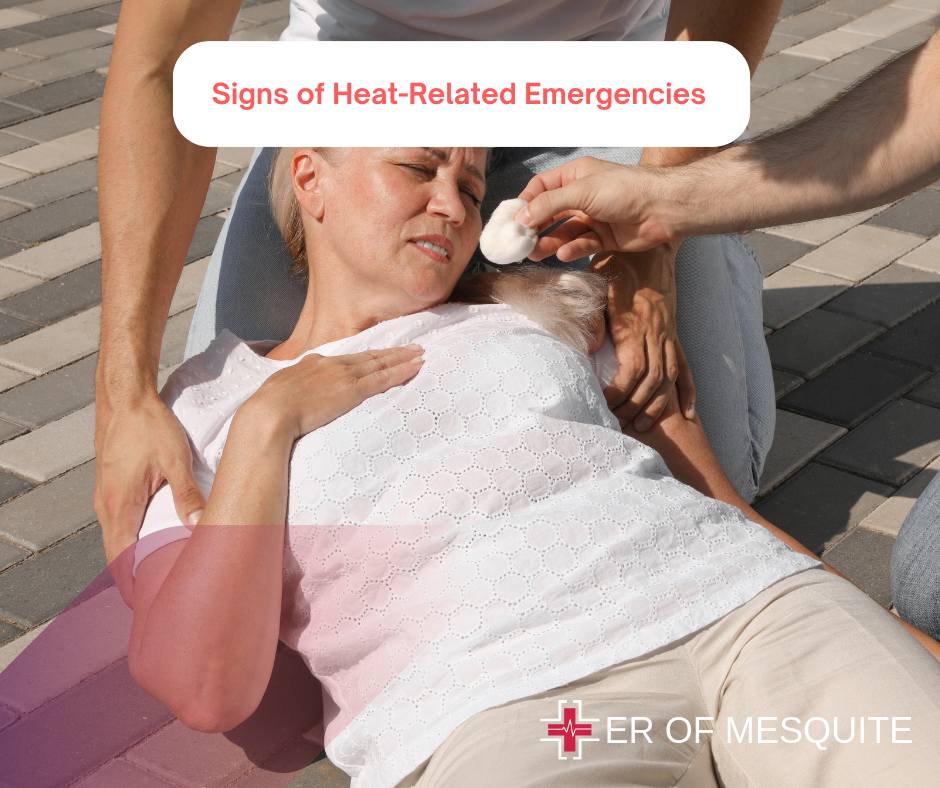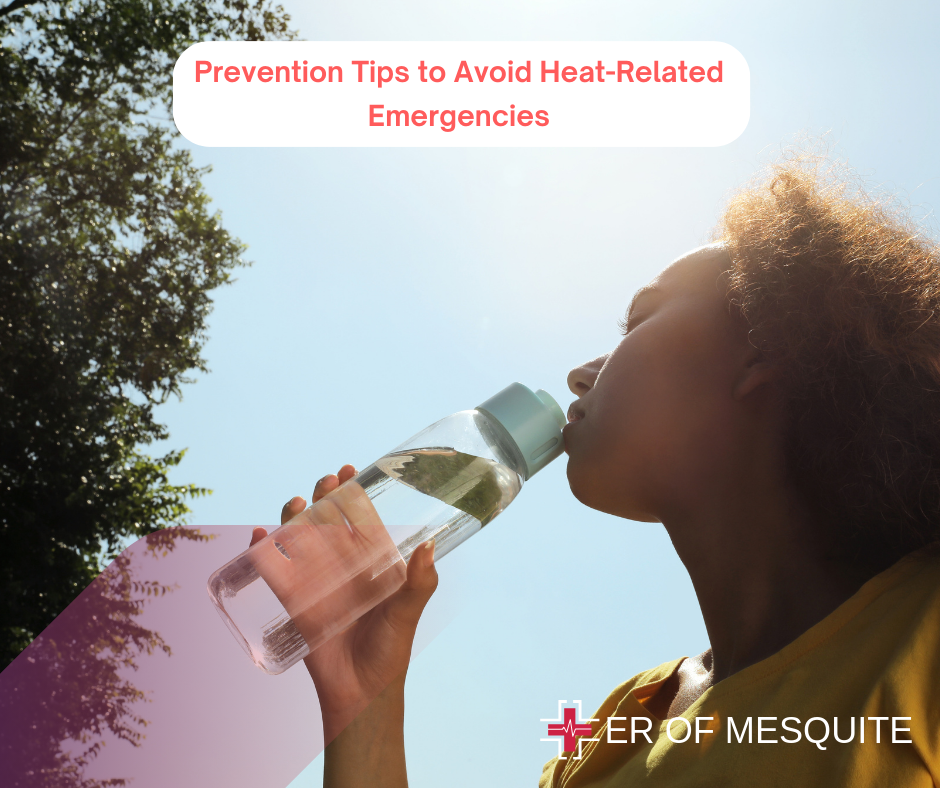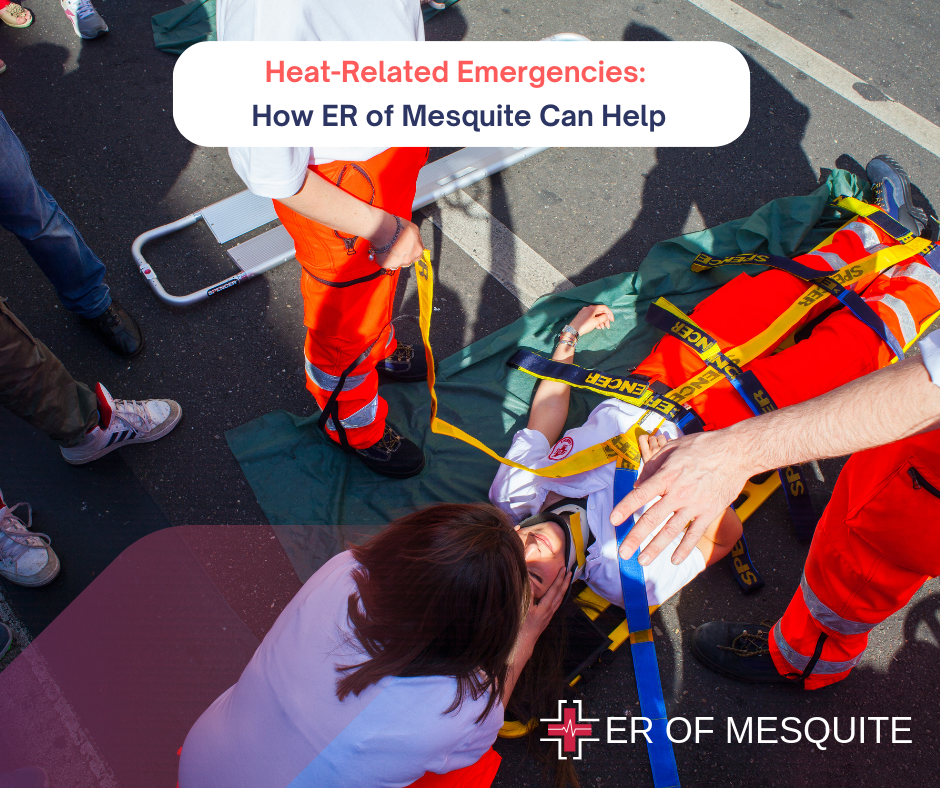When summer temperatures soar, the risk of heat related emergencies rises with them. From mild heat cramps to life-threatening heatstroke, these conditions can strike unexpectedly, hitting the most vulnerable—infants, young children, older adults, and those with health conditions.
Let’s explore the spectrum of heat-related illnesses, their warning signs, and crucial prevention strategies. Most importantly, you’ll learn how ER of Mesquite can help you with cutting-edge care when the heat becomes too much to handle.
Understanding Heat Related Emergencies

Heat related emergencies occur when the body’s ability to regulate its temperature is overwhelmed by excessive heat, leading to a rapid increase in core body temperature. These conditions can escalate quickly from minor symptoms to severe, life-threatening situations. The most common heat-related illnesses include:
Heat Cramps: These are painful muscle cramps and spasms that typically occur in the legs or abdomen. They’re often an early warning sign of heat related emergencies, usually triggered by prolonged physical activity in a hot environment, which leads to excessive sweating and loss of salt and water.
Heat Exhaustion: This condition is more serious than heat cramps and results from significant loss of fluids and electrolytes due to heavy sweating. Symptoms of heat exhaustion include heavy sweating, weakness, dizziness, headache, nausea, and fainting. Without prompt intervention, heat exhaustion can progress to heatstroke.
Heatstroke: The most severe heat related emergencies, heatstroke, occurs when the body’s core temperature rises above 104°F (40°C). It’s a medical emergency that requires immediate attention. Symptoms include confusion, seizures, loss of consciousness, hot and dry skin, and a rapid heartbeat. If not treated promptly, heatstroke can lead to organ failure and even death.
Signs of Heat Related Emergencies

Recognizing the early signs of heat-related illnesses can help prevent serious complications. Key symptoms to watch for include:
- Excessive Sweating: While sweating is the body’s natural cooling mechanism, excessive sweating accompanied by clammy skin can indicate heat exhaustion.
- Muscle Cramps: These can signal the onset of a heat related emergencies, especially after intense physical activity.
- Weakness or Fatigue: Feeling unusually tired or weak, especially after being in the heat, could be a sign of heat exhaustion.
- Dizziness or Lightheadedness: These symptoms may occur due to dehydration or heat exhaustion and can lead to fainting.
- Nausea or Vomiting: Common in both heat exhaustion and heatstroke.
- Rapid Pulse and Breathing: A fast heart rate or rapid breathing can signal that the body is struggling to maintain a normal temperature.
- Confusion or Disorientation: This is a serious symptom of heatstroke, requiring immediate medical attention.
- Loss of Consciousness: A critical sign of severe heat stroke that needs urgent medical intervention.
Prompt heat exhaustion help can prevent these symptoms from escalating into more severe conditions.
Prevention Tips to Avoid Heat Related Emergencies

Prevention is the best defense against heat related emergencies. Here are some practical heat wave safety tips to keep in mind:
- Stay Hydrated: Drink plenty of fluids, particularly water, throughout the day. Aim to drink before you feel thirsty.
- Wear Appropriate Clothing: Choose lightweight, loose-fitting, and light-colored clothing to help keep cool. A wide-brimmed hat and sunglasses offer additional protection from the sun.
- Avoid Peak Heat Hours: Stay indoors or in shaded areas during the hottest parts of the day, usually between 10 a.m. and 4 p.m.
- Apply Sunscreen: Use a broad-spectrum sunscreen with an SPF of 30 or higher to protect against sunburn, which can affect the body’s ability to cool itself.
- Use Cooling Devices: Fans, air conditioning, and cool showers can help maintain a lower body temperature.
- Check on Vulnerable Populations: Regularly check on older adults, young children, and those with chronic illnesses, as they are more susceptible to heat related emergencies.
- Know Your Medications: Some medications can increase sensitivity to heat. Consult with your healthcare provider about any potential risks associated with your prescriptions.
For more prevention tips, see our comprehensive guide to stay safe in summers.
How ER of Mesquite Can Help In Heat Related Emergencies?
At Mesquite ER, we’re equipped to handle all levels of heat related emergencies with state-of-the-art facilities and expert care. For mild cases of heat exhaustion, our IV medication and fluids treatment can rapidly rehydrate and replenish your electrolytes.
In more severe cases, such as heatstroke, our expert staff can administer temperature reduction techniques and continuous cardiac monitoring to prevent complications. The on-site CT scans and ECG tests allow for quick assessment of organ damage, while our certified full-service laboratory provides immediate blood work results to guide treatment.
For patients with underlying conditions exacerbated by heat, such as heart problems, we can perform cardiac enzyme tests for crucial diagnostics. With 24/7 availability and a variety of emergency services, our ER in Mesquite provides life-saving care for any heat related emergencies.
FAQs
Is ORS good for heat stroke?
Oral rehydration solution (ORS) is not suitable for treating heatstroke; immediate medical attention is required.
What is the best remedy for heat stroke?
The best remedy for heatstroke is immediate cooling of the body and seeking emergency medical care.
Which vitamin reduces heat?
Citrus fruits like oranges, lemons, and limes are excellent sources of water and vitamin C during the summer. They can help keep you hydrated, potentially reduce body temperature, boost energy, and support skin health in hot weather.
Is a sunstroke the same as a heat stroke?
Sunstroke is a form of heat stroke caused specifically by prolonged exposure to direct sunlight, while heatstroke is a broader term for severe overheating from any cause.
